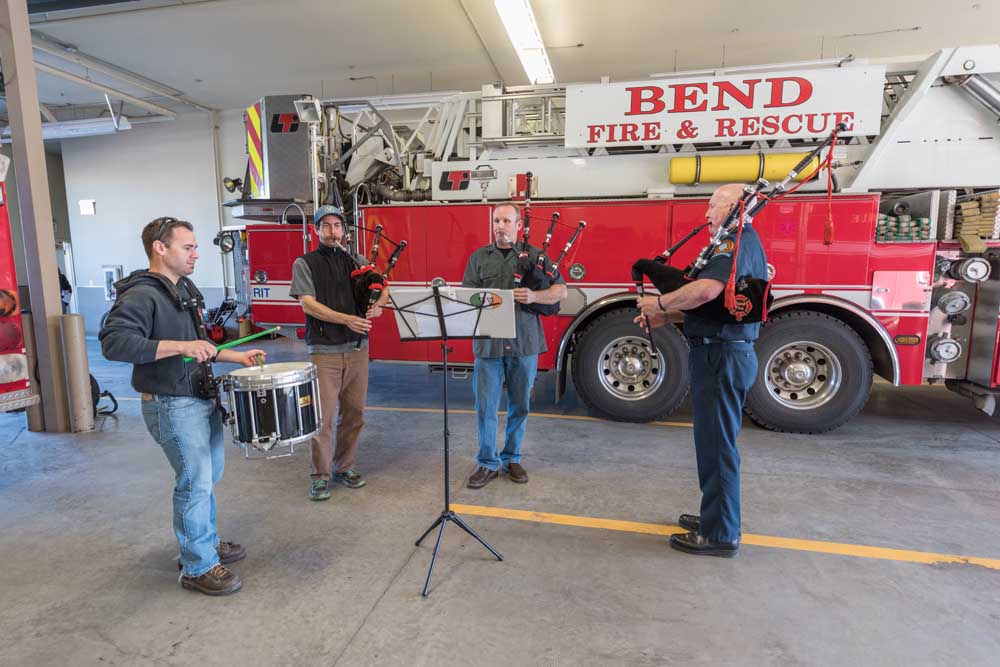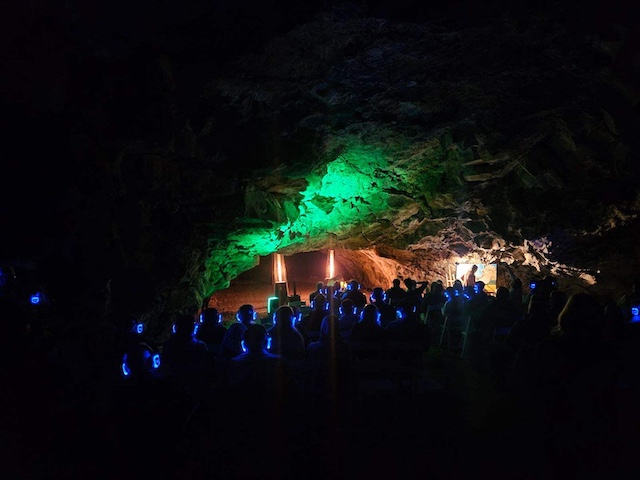The Sound of Tradition
Published 12:00 am Saturday, March 12, 2016

- The Sound of Tradition
It’s a sound like no other. A low, sustained hum hangs in the air while higher, faster notes pierce through the front lines, all carried along by the beat of rolling drums.
To some people, the sound of bagpipes is inspiring and stirs emotions from deep within the soul. Maybe (as a few mystics believe) it evokes inherited memories from ancestors long forgotten. To others, it makes their ears ring and dogs howl.
“Most people like the sound of pipes, but some people hate it,” said Mike Baxter, Bend Fire Department captain and pipe major for the Bend Fire Department’s Pipes & Drum Band.
But for the sake of this story, and the fact that St. Patrick’s Day is a few days away, we’ll raise our pints and a give a cheer for this (most often than not) beloved music.
And like green beer, St. Patrick’s Day just wouldn’t feel right without the sound of bagpipes, whether they be Irish or Scottish pipes. Luckily, Bend has its very own, homegrown Scottish piping band, courtesy of the Bend Fire Department.
The Bend Fire Pipes & Drums consists of 12 active firefighters from the Bend Fire Department; 10 men and two women.
The main purpose of the piping band is to preserve the tradition of honoring any emergency service and military personnel who has died in the line of duty with a bagpipe and drums funeral procession at no charge.
The band also performs at fire department and various city ceremonies, fire and non-fire service related events, fundraisers and parades and is available for hire at private events such as parties, weddings and funerals. The band is solely supported by its members, paid performances, and private donations.
THE HISTORY OF BAGPIPES AND FIREFIGHTERS
The idea to form a Scottish bagpipe and drum band of Bend firefighters came about in 2008, in part for the hope of free beer, but mostly for the love of Celtic music and its history with firefighting.
In American cities across the country in the early 1800s, recruiting firefighters was a daunting task.
Most of the men willing to attempt this dangerous job were the Irish, explained Baxter. When a firefighter was killed in the line of duty, his fellow comrades would honor his life by playing the Irish pipes during the funeral.
Other non-Irish firefighters soon gained an appreciation for the music and wanted the pipes played at non-Irish firefighter funerals as well.
Irish pipes, Baxter explained, are much quieter than Scottish pipes, and didn’t carry the sound as far during outdoor funerals. Eventually, the loudness of the Scottish pipes took over and the tradition was born.
Today it’s common for fire stations across the country to have their own piping bands. The Bend band practices the same sets and tunes as other fire departments across the Pacific Northwest so that at any given time they can join up and play together, said Baxter.
Bend Fire Pipes & Drums is a member of the Northwest Firefighters Pipe Band Association. Bend pipe band members have performed in the annual National Fallen Firefighters Foundation Memorial held in the fall in Maryland, where several hundred pipes and drums perform together.
“It’s amazing to hear the music,” said Taylor.
The learning curve was steep for the Bend firefighters who enlisted in the new band, because none of them had ever picked up a set of bagpipes before. Some had never played any musical instrument at all. A few of the members had some musical experience and the band was able to find local piping and drumming instructors.
It took the band two years of diligent practicing before they were ready to make their first public performance.
“Some of us literally used flash cards of individual notes and others watched videos,” said Mark Taylor, piper and fire department chief of training safety.
All of the band members agree that bagpipes are a difficult instrument to master because they are sensitive to changes in temperature and moisture. Scottish bagpipes have many moving parts that make them a challenging instrument to manage and learn, explained Chris Guy, engineer, paramedic and pipe band manager.
“It takes a little over a year for most of us to go from ground zero to being able to play in public,” said Taylor.
Members of the band spend about two hours of their off-duty time each week practicing, in addition to many hours spent performing publicly.
“It’s quite a time commitment,” said Tim Reardon, firefighter and piper, adding that most of the original members still play with the band.
During a recent practice inside a Bend fire station, the sound of bagpipes in perfect harmony resonated in the engine bays during the song, “The Bluebells of Scotland.” A rolling drum beat carried the music along with a gentle cadence.
That’s not to say there haven’t been blooper moments. There have been times when some of the pipers in the band started playing different songs all at the same time.
“It’s almost like fireworks going off,” said Baxter with a smile. “It doesn’t happen very often, but hopefully when it does we’re in a crowded bar. We can stop, give a quick laugh and get going again.”
Not only do the band members volunteer their free time, they’ve also paid for their instruments and uniforms out of pocket. The initial cost of the uniforms totaled more than $700 per band member.
The band follows a drum major’s manual to make sure they are in line with the proper elements of a Highland uniform, which has a lot of variations, said Baxter.
“One thing you don’t want to do is wear the wrong thing so we’ve done a lot of research on what’s proper,” he said.
The Bend pipe band wears a mix of a formal and less formal Highland dress.
The pattern of the kilt (tartan) worn by the Bend Fire Pipes & Drums has an interesting tie to local history.
Tricia Connolly, fire captain and an original drummer in the band, found the McKay (pronounced Mc-eye) tartan and recognized the name from Bend history. It just so happened that Clyde McKay was involved in the committee to form the Bend Fire Department in 1919 and was later honored with a street and a park in Bend.
MYSTERY OF THE KILT
There’s an old Celtic blessing (alright, so it’s mostly Irish) that says, “May the wind always be at your back.” But it doesn’t work when you’re wearing a kilt.
“We had the cycle-cross thing and I don’t know about you guys, but my kilt was flying up in the wind,” Baxter said as he looked toward his bandmates.
“Kilts were flying up but we kept on playing.”
On the subject of kilts, it’s the question that every kilt-wearing musician has been asked at least 100 times: So just what IS under that kilt?
Baxter and his fellow bandmates all laughed, but gave no real clear answer (to preserve the mystery perhaps).
“Shoes and socks is my usual response,” said Taylor.
“Nice girls ask and bad girls find out,” chimed in Baxter.
There have been times when people simply skip the question altogether and stick a camera under the kilt, said Reardon.
Really? Yes, really.
“Sometimes we have people who just check,” said Baxter.
ST. PATRICK’S DAY PUB CRAWL
So one might wonder, with all the time invested into this band, did it pay off in free beer?
“The pubs always give us beer,” said Baxter, but for the sake of professionalism the band limits themselves to two beers an hour. Because yes, being able to carry a tune on the pipes really does matter.
The Bend Pipes & Drums band will perform during a downtown Bend pub crawl on St. Patrick’s Day. The band will start around 2 p.m. at McMenamins and make their way through downtown Bend, stopping at Deschutes Brewery, D&D, JC’s and Summit. They will end the day at Sidelines around 9 p.m. Each performance will last about 45 minutes.
For information on hiring the band for private events, visit www.bendfirepipesanddrums.com or call Chris Guy, 541-410-1271.






